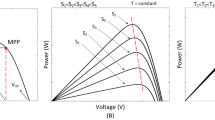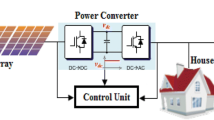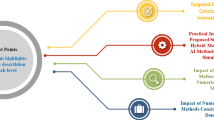Abstract
In this paper, firefly algorithm (FA) for optimal tuning of PI controllers for load frequency control of hybrid system composing of photovoltaic (PV) system and thermal generator is introduced. Also, maximum power point tracking of PV is considered in the design process. The block diagram of the hybrid system is performed. To robustly tune the parameters of controllers, a time domain-based objective function is established which is solved by the FA. Simulation results are presented to show the improved performance of the suggested FA-based controllers compared with genetic algorithm (GA). These results show that the proposed controllers present better performance over GA in terms of settling times and different indices.













Similar content being viewed by others
Abbreviations
- f :
-
The system frequency in Hz
- i :
-
Subscript referring to area (\(i = 1, 2\))
- \({R}_{{i}}\) :
-
The regulation constant (Hz/p.u MW) for area i
- \({K}_\mathrm{g}, {T}_\mathrm{g}\) :
-
The gain and time constant in second of governor for thermal unit
- \({K}_\mathrm{t}, {T}_\mathrm{t}\) :
-
The gain and time constant in second of turbine
- \({T}_\mathrm{r}\) :
-
The reheat time constant in second
- \({K}_\mathrm{r}\) :
-
The p.u megawatt rating of high pressure stage for area i
- \({T}_\mathrm{P}, {K}_\mathrm{P}\) :
-
The time constant and gain of power system respectively for thermal unit
- \(\Delta {P_\mathrm{tie}}_{i}\) :
-
The difference between the actual tie-line power and scheduled one
- B :
-
The biasing factor in p.u MW/Hz
- \({K}_{\mathrm{P}_{i}}, {K}_{{\mathrm{I}_i}}\) :
-
The gains of PI controller of area i
- \({T}_{12}\) :
-
Synchronizing coefficient
- J :
-
Objective function
- \({U}_{i}\) :
-
The control signal of area i
- \({K}_{i}\) :
-
The controller of area i
- \({K}_{{\mathrm{P}_i}}^{\min }, {K}_{{\mathrm{P}_i}}^{\max }\) :
-
The minimum and maximum limit of proportional gain of area i
- \({K}_{{\mathrm{I}_i}}^{\min }, {K}_{{\mathrm{I}_i}}^{\max }\) :
-
The minimum and maximum limit of integral gain of area i
- LFC:
-
Load frequency control
- GA:
-
Genetic algorithm
- FL:
-
Fuzzy logic
- NN:
-
Neural network
- PI:
-
Proportional plus integral
- FA:
-
Firefly algorithm
- ACE:
-
Area control error
- PV:
-
Photovoltaic system
- MPPT:
-
Maximum power point tracking
- IAE:
-
The integral of absolute value of the error
- ITAE:
-
The integral of the time multiplied absolute value of the error
- ISE:
-
The integral of square error
- ITSE:
-
The integral of time multiply square error
References
Elgerd OI (2006) Electric energy systems theory. Tata McGraw - Hill, New Delhi
Bevrani H (2014) Robust power system frequency control, 2nd edn. Springer, Cham
Wang Y, Zhou R, Wen C (1993) Robust load-frequency controller design for power systems. IEE Proc Gener Transm Distrib 140(1):11–16
Azzam M (1999) Robust automatic generation control. Energy Convers Manag 40:1413–1421
Lee HJ, Park JB, Joo YH (2006) Robust load-frequency control for uncertain nonlinear power systems: a fuzzy logic approach. Int J Inf Sci 176(23):3520–3537
Tan W, Xu Z (2009) Robust analysis and design of load frequency controller for power systems. Electr Power Syst Res 79(5):846–853
Tan W, Zhou H (2012) Robust analysis of decentralized load frequency control for multi-area power systems. Int J Electr Power Energy Syst 43(1):996–1005
Chidambaram IA, Paramasivam B (2009) Genetic algorithm based decentralized controller for load- frequency control of interconnected power systems with RFB considering TCPS in the tie-line. Int J Electron Eng Res 1(4):299–312
Sakhavati A, Gharehpetian GB, Hosseini SH (2011) Decentralized robust load-frequency control of power system based on quantitative feedback theory. Turk J Electr Eng Comput Sci 19(4):513–530
Selvakumaran S, Parthasarathy S, Karthigaivel R, Rajasekaran V (2012) Optimal decentralized load frequency control in a parallel AC–DC interconnected power system through HVDC link using PSO algorithm. Energy Procedia 14:1849–1854
Singla H, Kumar A (2012) LQR based load frequency control with SMES in deregulated environment. In: Annual IEEE India Conference (INDICON), 7–9 Kochi, pp 286–292
Pandey SK, Mohanty SR, Kishor N, Catalão JPS (2013) An advanced LMI-based-LQR design for load frequency control of an autonomous hybrid generation system. In: Camarinha- Matos LM, Tomic S, Graça P (eds) Technological innovation for the Internet of Things, DoCEIS 2013. IFIP advances in information and communication technology, vol 394. Springer, Berlin, Heidelberg
Liaw CM (1991) A modified optimal load-frequency controller for interconnected power systems. Opt Control Appl Methods 12(3):197–204
Hasan N (2012) Design and analysis of pole-placement controller for interconnected power systems. Int J Emerg Technol Adv Eng 2(8):212–217
Bengiamin NN, Chan WC (1982) Variable structure control of electric power generation. IEEE Trans Power Appar Syst 101:376–380
Umrao R, Chaturvedi DK, Malik OP (2011) Load frequency control: a polar fuzzy approach. In: Panigrahi BK, Suganthan PN, Das S, Satapathy SC (eds) Swarm, evolutionary, and memetic computing. Lecture Notes in Computer Science, vol 7076. Springer, Berlin, Heidelberg
Bevrani H, Daneshmand PR (2012) Fuzzy logic-based load-frequency control concerning high penetration of wind turbines. IEEE Syst J 6(1):173–180
Umrao R, Chaturvedi DK (2013) A novel fuzzy control approach for load frequency control. In: Malathi R, Krishnan J (eds) Recent advancements in system modeling applications. Lecture Notes in Electrical Engineering, vol 188. Springer, India
Zamee MA, Mitra D, Tahhan SY (2013) Load frequency control of interconnected hydro-thermal power system using conventional PI and fuzzy logic controller. Int J Energy Power Eng 2(5):191–196
Yousef HA, AL-Kharusi K, Albadi MH, Hosseinzadeh N (2014) Load frequency control of a multi-area power system: an adaptive fuzzy logic approach. IEEE Trans Power Syst 29(4):1822–1830
Prakash S, Sinha S (2011) Load frequency control of three area interconnected hydro-thermal reheat power system using artificial intelligence and PI controllers. Int J Eng Sci Technol 4(1):23–37
Nag S, Philip N (2013) Application of neural networks to automatic load frequency control. In: Panigrahi BK, Suganthan PN, Das S, Dash SS (eds) Swarm evolutionary, and memetic computing, SEMCCO 2013. Lecture Notes in Computer Science, vol 8298. Springer, Cham
Francis R, Chidambaram IA (2013) Application of modified dynamic neural network for the load frequency control of a two area thermal reheat power system. Int Rev Autom Control 6(1):47–53
Ramesh S, Krishnan A (2009) Modified genetic algorithm based load frequency controller for interconnected power systems. Int J Electr Power Eng 3(1):26–30
Milani AE, Mozafari B (2011) Genetic algorithm based optimal load frequency control in two area interconnected power system. Global J Technol Optim 2:6–10
Jeyalakshmi V, Subburaj P (2015) Load frequency control in two area multi units interconnected power system using multi objective genetic algorithm. WSEAS Trans Power Syst 10:35–45
Ghoshal SP (2004) Optimizations of PID gains by particle swarm optimizations in fuzzy based automatic generation control. Int J Electr Power Syst Res 72(3):203–212
Hooshmand R, Ataei M, Zargari A (2012) A new fuzzy sliding mode controller for load frequency control of large hydropower plant using particle swarm optimization algorithm and kalman estimator. Eur Trans Electr Power 22(6):812–830
GiriBabu V, Hemanth B, Kumar TS, Prasanth BV (2014) Single area load frequency control problem using particle swarm optimization. Int J Eng Sci 3(6):46–52
Jagatheesan K, Anand B, Ebrahim MA (2014) Stochastic particle swarm optimization for tuning of PID controller in load frequency control of single area reheat thermal power system. Int J Electr Power Eng 8(2):33–40
Ali ES, Abd-Elazim SM (2011) Bacteria foraging optimization algorithm based load frequency controller for interconnected power system. Int J Electr Power Energy Syst 33(3):633–638
Ali ES, Abd-Elazim SM (2013) BFOA based design of PID controller for two area load frequency control with nonlinearities. Int J Electr Power Energy Syst 51:224–231
Saikia LC, Sahu SK (2013) Automatic generation control of a combined cycle gas turbine plant with classical controllers using firefly algorithm. Int J Electr Power Energy Syst 53:27–33
Padhan S, Sahu RK, Panda S (2014) Application of firefly algorithm for load frequency control of multi-area interconnected power system. Electr Power Compon Syst 42(13):1419–1430
Sahu RK, Panda S, Padhan S (2015) A novel hybrid gravitational search and pattern search algorithm for load frequency control of nonlinear power system. Appl Soft Comput 29:310–327
Abd-Elaziz AY, Ali ES (2015) Cuckoo search algorithm based load frequency controller design for nonlinear interconnected power system. Int J Electr Power Energy Syst 73C:632–643
Abd-Elazim SM, Ali ES (2016) Load frequency controller design via BAT algorithm for nonlinear interconnected power system. Int J Electr Power Energy Syst 77C:166–177
Yang XS (2010) Nature-inspired metaheuristic algorithms, 2nd edn. Luniver Press, Frome
Yang XS (2010) Firefly algorithm, stochastic test functions and design optimization. Int J Bio-Inspired Comput 2(2):78–84
Yang XS (2010) Firefly algorithm, levy flights and global optimization. In: Bramer M, Ellis R, Petridis M (eds) Research and development in intelligent systems, XXVI. Springer, London
Hashmi A, Goel N, Goel S, Gupta D (2013) Firefly algorithm for unconstrained optimization. IOSR J Comput Eng 11(1):75–78
Mahapatra S, Panda S, Swain SC (2014) A hybrid firefly algorithm and pattern search technique for SSSC based power oscillation damping controller design. Ain Shams Eng J 5(4):1177–1188
Ndongmo J, Kenné G, Fochie R, Cheukem A, Fotsin H, Lagarrigue F (2014) A simplified nonlinear controller for transient stability enhancement of multimachine power systems using SSSC device. Int J Electr Power Energy Syst 54:650–657
Rajalakshmi N, Subramanian DP, Thamizhavel K (2015) Performance enhancement of radial distributed system with distributed reconfiguration using binary firefly algorithm. J Inst Eng Ser B 96(1):91–99
Yang XS, Hosseini SSS, Gandomi AH (2012) Firefly algorithm for solving non-convex economic dispatch problems with valve loading effect. Appl Soft Comput 12:1180–1186
Chandrasekaran K, Simon SP, Padhy NP (2013) Binary real coded firefly algorithm for solving unit commitment problem. Inf Sci 249:67–84
Santy T, Natesan R (2015) Load frequency control of a two area system consisting of a grid connected PV system and diesel generator. Int J Emerg Technol Comput Electron 13(1):456–461
Tomy FT, Prakash R (2014) Load frequency control of a two area hybrid system consisting of a grid connected PV system and thermal generator. Int J Res Eng Technol 3(7):573–580
Ali ES (2015) Speed control of DC series motor supplied by photovoltaic system via firefly algorithm. Neural Comput Appl 26(6):1321–1332
Oshaba AS, Ali ES, Abd-Elazim SM (2017) PI controller design for MPPT of photovoltaic system supplying SRM via BAT search algorithm. Neural Comput Appl 28(4):651–667
Oshaba AS, Ali ES, Abd-Elazim SM (2017) PI controller design using ABC algorithm for MPPT of PV system supplying DC motor pump load. Electr Eng 28(2):353–364
Ali ES (2016) Imperialist competitive algorithm for speed control of induction motor supplied by wind turbine. Electr Eng 98:179–187
Holland JH (1992) Adaptation in natural and artificial systems: an introductory analysis with applications to biology, control, and artificial intelligence, Reprint edn. A Bradford Book, Cambridge
Author information
Authors and Affiliations
Corresponding author
Appendix
Appendix
The system data are as shown below:
-
(a)
The parameters of the thermal system: \(T_P=20\,\text {s}\); \({T}_\mathrm{t} =0.3\,\text {s}\); \({T}_\mathrm{r}==10\,\text {s}\); \(T_{12}=0.545\,\text {p.u}\); \({T}_\mathrm{g}=0.08\,\text {s}\); \({K}_\mathrm{P} =120\,\text {Hz/p.u MW}\); \(B=0.8\,\hbox {p.u MW/Hz}\); \({a}_{12}=-1\); \(R=0.4\) Hz/p.u MW; \({K}_{\mathrm{r1}}=0.33\,\text {p.u MW}\).
-
(b)
The parameters of FA: the contrast of the attractiveness \(=\) 1.0; the attractiveness \(=\) 0.1 at \({r}=0\); randomization parameter \((\alpha )=0.1\); maximum number of generations \(=\) 100; number of fireflies \(=\) 50.
-
(c)
The parameters of GA are as follows: max generation \(=\) 100; population size \(=\) 50; crossover probabilities \(=\) 0.75; mutation probabilities \(=\) 0.1.
Rights and permissions
About this article
Cite this article
Abd-Elazim, S.M., Ali, E.S. Firefly algorithm-based load frequency controller design of a two area system composing of PV grid and thermal generator. Electr Eng 100, 1253–1262 (2018). https://doi.org/10.1007/s00202-017-0576-5
Received:
Accepted:
Published:
Issue Date:
DOI: https://doi.org/10.1007/s00202-017-0576-5




